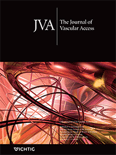
Journal of Vascular Access
Scope & Guideline
Bridging theory and practice in vascular access.
Introduction
Aims and Scopes
- Clinical outcomes and complications of vascular access devices:
Research in this area includes studies on the effectiveness, safety, and complications associated with various vascular access devices, including peripherally inserted central catheters (PICC), tunneled catheters, and arteriovenous fistulas. - Innovative techniques and technologies in vascular access:
The journal highlights advancements in ultrasound-guided procedures, new catheter designs, and novel techniques for improving vascular access, aiming to enhance patient outcomes and procedural success. - Patient-centered approaches and quality of life assessments:
Research focusing on patient experiences, satisfaction, and quality of life in relation to vascular access is emphasized, underscoring the importance of patient perspectives in clinical decision-making. - Interventional strategies and management of vascular access complications:
Studies investigating methods for managing complications such as thrombosis, infection, and occlusion of vascular access devices are frequently published, offering insights into effective treatment strategies. - Education and training in vascular access techniques:
The journal addresses the need for improved education and training for healthcare professionals in vascular access procedures, with a focus on competency development and skill enhancement.
Trending and Emerging
- Ultrasound-guided vascular access techniques:
There is a growing emphasis on research related to ultrasound-guided techniques for vascular access, as these methods improve success rates and reduce complications associated with traditional approaches. - Device innovation and technology integration:
Recent publications have increasingly focused on the development and evaluation of new vascular access devices, including drug-coated balloons, bioengineered grafts, and other advanced materials designed to enhance patient outcomes. - Management of complications and infection prevention:
Research addressing strategies for preventing and managing complications, particularly infections associated with vascular access devices, has gained prominence, reflecting the ongoing need for improved patient safety. - Patient-reported outcomes and quality of life:
There is a rising interest in studies that assess patient-reported outcomes related to vascular access, emphasizing the importance of understanding how access impacts patients' quality of life and satisfaction with care. - Interdisciplinary approaches and team-based care:
Emerging research highlights the effectiveness of multidisciplinary teams in managing vascular access, showcasing how collaborative approaches can improve care delivery and patient outcomes.
Declining or Waning
- Basic anatomical studies related to vascular access:
There has been a noticeable decrease in studies focusing solely on anatomical aspects of vascular access, as the field has shifted towards more applied research that integrates technology and clinical outcomes. - Traditional methods of vascular access:
As new technologies and techniques emerge, traditional methods of vascular access, such as older catheter designs or non-ultrasound-guided approaches, are being less frequently discussed in favor of more innovative solutions. - Longitudinal studies without immediate clinical relevance:
The journal has seen a reduction in the publication of long-term observational studies that do not directly inform current clinical practices or interventions, indicating a shift towards more immediate and practical research outcomes.
Similar Journals

Stroke and Vascular Neurology
Exploring the frontiers of stroke management.Stroke and Vascular Neurology is a premier open access journal published by BMJ PUBLISHING GROUP, dedicated to advancing the field of vascular neurology and cardiology. With an ISSN of 2059-8688 and an E-ISSN of 2059-8696, the journal has established itself as a leading platform for disseminating cutting-edge research since its transition to open access in 2016. Based in the United Kingdom, at BRITISH MED ASSOC HOUSE, TAVISTOCK SQUARE, LONDON WC1H 9JR, ENGLAND, the journal's outstanding reputation is reflected in its Q1 rankings in both Cardiology and Cardiovascular Medicine and Neurology (clinical) for 2023, placing it in the top tier of its categories. With Scopus rankings of 28 out of 387 in Cardiology and 30 out of 400 in Neurology (clinical), both within the 92nd percentile, Stroke and Vascular Neurology serves as an essential resource for researchers, clinicians, and students looking to stay at the forefront of advancements in the management and understanding of stroke-related disorders. The journal's commitment to high-quality research contributes significantly to improving patient outcomes and shaping the future of vascular health.
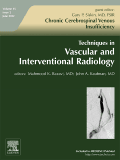
Techniques in Vascular and Interventional Radiology
Leading the Charge in Vascular and Interventional Research.Techniques in Vascular and Interventional Radiology, published by Elsevier, is a distinguished journal dedicated to the rapidly evolving field of vascular and interventional radiology. With an ISSN of 1089-2516 and an E-ISSN of 1557-9808, this journal serves as a critical platform for disseminating innovative research and practical advancements in the diagnosis and management of vascular diseases. Operating from the United States, it has established a significant presence in the academic community, evidenced by its 2023 Scopus rankings placing it in the Q3 quartile for both Cardiology and Cardiovascular Medicine and Radiology, Nuclear Medicine and Imaging. The journal aims to publish high-quality articles that encompass both clinical applications and novel technologies, making it an essential resource for researchers, clinicians, and students alike. With its commitment to fostering knowledge and collaboration in this vital area of medicine, Techniques in Vascular and Interventional Radiology plays a key role in advancing patient care and clinical practice.
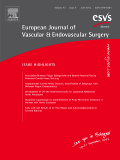
EUROPEAN JOURNAL OF VASCULAR AND ENDOVASCULAR SURGERY
Unveiling the Latest in Vascular InnovationsThe European Journal of Vascular and Endovascular Surgery, published by W B Saunders Co Ltd, is a leading academic periodical in the fields of cardiology and surgery, boasting an impressive impact factor thanks to its high-quality peer-reviewed studies and clinical insights. With a publication history spanning from 1995 to 2024, this journal consistently ranks in the Q1 category for both Cardiology and Cardiovascular Medicine and Surgery, demonstrating its significance and influence in the medical community. Furthermore, it holds respectable positions in Scopus Ranks, being ranked #28 out of 551 in Medicine & Surgery and #72 out of 387 in Medicine & Cardiology, placing it in the top 95th and 81st percentiles respectively. While not an Open Access journal, the wealth of knowledge it offers is vital for researchers, healthcare professionals, and students dedicated to advancing vascular and endovascular surgical practices. Accessing this journal allows for the exploration of innovative methodologies and the latest developments in the management of vascular diseases, ensuring that readers remain at the forefront of their fields.
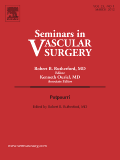
Seminars in Vascular Surgery
Elevating surgical excellence through knowledge.Seminars in Vascular Surgery is a premier academic journal dedicated to advancing the field of vascular surgery and related cardiovascular medicine. Published by W B Saunders Co-Elsevier Inc., this journal boasts a commendable reputation within the academic community, evidenced by its classification in the Q1 quartile for both Cardiology and Cardiovascular Medicine and Surgery as of 2023. It serves as a critical resource for researchers, clinicians, and students, providing high-quality, peer-reviewed articles that cover the latest advancements, techniques, and interdisciplinary approaches in vascular surgery. With an ISSN of 0895-7967 and an E-ISSN of 1558-4518, the journal is poised to offer an invaluable platform for scholarship, with a varied scope reflecting decades of research from 1990 to 2024. By submitting your work, you join a cohort of scholars dedicated to elevating the standards of vascular surgical practice and improving patient outcomes.

EJVES Vascular Forum
Empowering the Future of Vascular Surgery and MedicineEJVES Vascular Forum, published by Elsevier, is a premier open access journal focusing on the interdisciplinary field of vascular surgery and cardiovascular medicine. Since its inception in 2001, the journal has provided a vital platform for the dissemination of high-quality research and innovative clinical practices, addressing critical issues in vascular health. With an ISSN of 2666-688X, it has gained recognition within its community, attaining a Q3 quartile ranking in both cardiology and surgery categories as of 2023, and showcasing its relevance and impact within the medical research landscape. Situated in the United Kingdom and accessible globally, the EJVES Vascular Forum invites contributions that foster collaboration and enhance knowledge in vascular surgery, making it an essential resource for researchers, professionals, and students alike. The journal's ranking within Scopus highlights its position among peers, adding further credence to its objectives of advancing science and improving patient care in the cardiovascular realm. By publishing rigorously peer-reviewed articles, the journal aims to be the go-to source of information and innovation for those dedicated to the progress of vascular health.
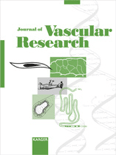
JOURNAL OF VASCULAR RESEARCH
Elevating the discourse in vascular research.Welcome to the JOURNAL OF VASCULAR RESEARCH, a reputable academic journal published by KARGER that has been a cornerstone of vascular research since 1964. With an ISSN of 1018-1172 and an E-ISSN of 1423-0135, this journal plays a vital role in disseminating cutting-edge research in the fields of Cardiology and Cardiovascular Medicine and Physiology. Currently categorized in the Q3 quartile for both disciplines, it ranks as #179 in Cardiology and #131 in Physiology according to Scopus, showcasing its significant contribution to the scientific community. Although the journal operates on a subscription basis, it strives to provide accessible content that informs and inspires researchers, professionals, and students alike. As the journal looks forward to its convergence in 2024, it continues to uphold its mission of advancing knowledge, fostering innovation, and encouraging collaboration within the dynamic realm of vascular research.
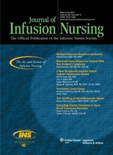
Journal of Infusion Nursing
Transforming infusion therapy with innovative insights.Journal of Infusion Nursing, published by Lippincott Williams & Wilkins, stands as a vital resource within the fields of nursing and healthcare. With a strong focus on infusion practices and patient care, this journal is committed to disseminating high-quality research and evidence-based practices that enhance nursing protocols and improve patient outcomes. As a quarterly publication, it is indexed in Scopus, ranking 32nd out of 139 in the general nursing category, with a commendable 77th percentile, highlighting its influence and relevance in the nursing community. Operating without open access, the journal is dedicated to covering a spectrum of topics from emerging techniques in infusion therapy to comprehensive reviews that inform clinical practice, making it an essential read for researchers, practitioners, and students alike. The Journal of Infusion Nursing not only facilitates knowledge sharing but also plays a crucial role in advancing the standards of nursing care in the United States and beyond.

Italian Journal of Vascular and Endovascular Surgery
Pioneering insights in vascular and endovascular surgery.Italian Journal of Vascular and Endovascular Surgery, published by EDIZIONI MINERVA MEDICA, serves as a pivotal platform in the realm of vascular and endovascular surgical research in Italy and beyond. With an ISSN of 1824-4777 and an E-ISSN of 1827-1847, this journal spans a decade of scholarly contributions from 2004 to 2024. Although currently categorized in the Q4 quartile within both Cardiology and Cardiovascular Medicine and Surgery, with Scopus ranks reflecting its growing recognition in the scientific community, it continues to foster advancements in the understanding and treatment of vascular diseases. The journal is dedicated to publishing innovative research, clinical studies, and comprehensive reviews that empower professionals and enrich the education of students in the vascular surgery field. While currently not offering open access, it remains an essential resource for those seeking to stay abreast of the latest developments and practices in vascular and endovascular surgery.
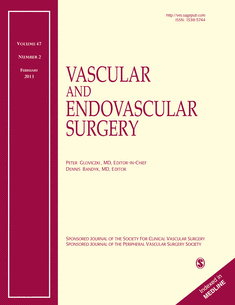
Vascular and Endovascular Surgery
Elevating Standards in Vascular and Endovascular PracticesVascular and Endovascular Surgery is a distinguished peer-reviewed journal dedicated to the advancements and innovations in the field of vascular and endovascular medicine. Published by SAGE Publications Inc, this journal serves as a vital platform for clinicians, researchers, and students keen to explore cutting-edge practices, surgical techniques, and emerging therapies within cardiovascular medicine. With an ISSN of 1538-5744 and an E-ISSN of 1938-9116, it has established a solid reputation since its inception, covering articles from its founding years in 1967 to its continuous releases up to 2024. The journal currently holds a Q3 quartile ranking in the categories of Cardiology and Cardiovascular Medicine and Surgery, highlighting its significance within the academic community. Although it is not an open-access journal, it offers valuable content that supports evidence-based practice and clinical decisions in vascular and endovascular procedures. By embracing multidisciplinary collaboration and fostering innovation, Vascular and Endovascular Surgery remains a critical resource for those invested in enhancing patient outcomes and advancing surgical methodologies.

Annals of Vascular Diseases
Exploring Innovations in Vascular PathologyAnnals of Vascular Diseases is a leading international journal dedicated to the comprehensive exploration of vascular pathology, aimed at advancing knowledge in the field through innovative research and insightful reviews. Published by the ANNALS VASCULAR DISEASES EDITORIAL OFFICE and available in both print (ISSN: 1881-641X) and electronic format (E-ISSN: 1881-6428), this journal has embraced Open Access since 2017, facilitating wider dissemination and accessibility of vital research findings. With its focus on clinical and experimental studies relating to vascular diseases, the journal serves as a crucial platform for researchers, medical professionals, and students who seek to stay at the forefront of clinical advancements. By fostering collaboration and sharing knowledge, Annals of Vascular Diseases plays a significant role in shaping the future of vascular research and treatment strategies worldwide.